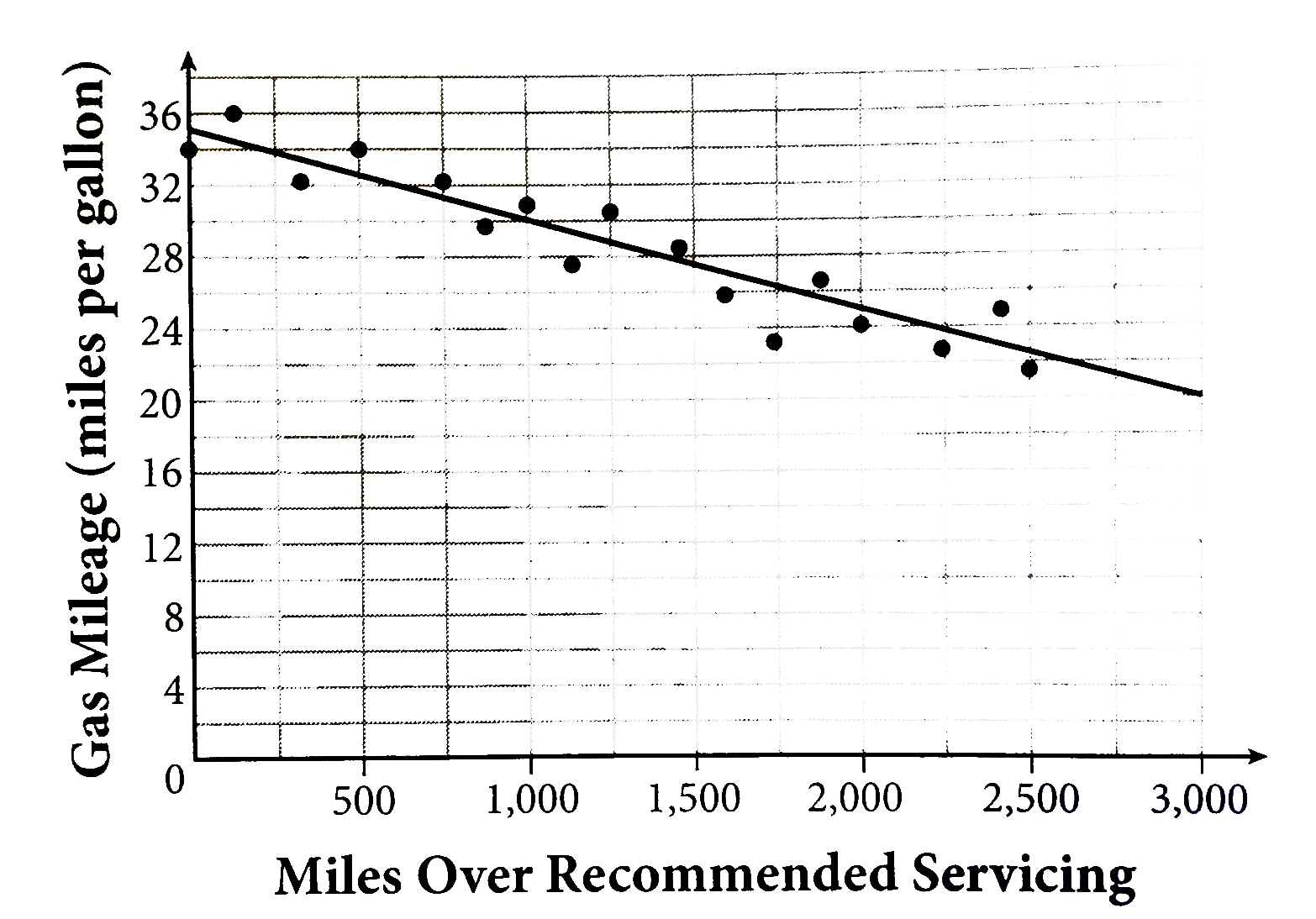The mileage (km per litre) of 50 cars of the same model was tested by a manufacture and details are tabulated as given below

Find the mean mileage. The manufacture claimed that the mileage of the model was 16 kmL. Do you agree with this claim?

Here ∑fi=50
∑fixi=724
Mean¯x=∑fixi∑fi
72450=14.48
Hence, mean mileage is 14.48kmL−
No, the manufacturer is claimed mileage 1.52kmh− more than average mileage.
Topper's Solved these Questions
- BOOK - NCERT EXEMPLAR ENGLISHCHAPTER - STATISTICS AND PROBABILITYEXERCISE - LONG ASWERS QUESTIONS14videos
STATISTICS AND PROBABILITY
- BOOK - NCERT EXEMPLAR ENGLISHCHAPTER - STATISTICS AND PROBABILITYEXERCISE - VERY SHORT ANSWERS QUESTIONS14videos
STATISTICS AND PROBABILITY
- BOOK - NCERT EXEMPLAR ENGLISHCHAPTER - REAL NUMBERSEXERCISE - LONG ANSWER TYPE QUESTIONS5videos
REAL NUMBERS
- BOOK - NCERT EXEMPLAR ENGLISHCHAPTER - SURFACE AREAS AND VOLUMESEXERCISE - LONG ANSWER TYPE QUESTIONS20videos
SURFACE AREAS AND VOLUMES
Similar Questions

A car manufacture compiled data that indicated gas mileage decreased ad the number of miles driven between recommended servicing increased. The manufacture used the equation y=−1200x+35 to model the data. Based on the information, how many miles per gallon could be expected if this particular car is drive 3,400 miles over the recommended miles between servicing ?View SolutionMany United States companies have, unfortunately, made the search for legal protection from import competition into a major line of work. Since 1980 the United States International Trade Commission (ITC) has received about 280 complaints alleging damage from imports that benefit from subsidies by foreign governments. Another 340 charge that foreign companies "dumped" their products in the United States at "less than fair value." Even when no unfair practices are alleged, the simple claim that an industry has been injured by imports is sufficient grounds to seek relief. Contrary to the general impression, this quest for import relief has hurt more companies than it has helped. As corporations begin to function globally, they develop an intricate web of marketing, production, and research relationships, The complexity of these relationships makes it unlikely that a system of import relief laws will meet the strategic needs of all the units under the same parent company. Internationalization increases the danger that foreign companies will use import relief laws against the very companies the laws were designed to protect. Suppose a United States-owned company establishes an Overseas plant to manufacture a product while its competitor makes the same product in the United States. If the competitor can prove injury from the imports and that the United States company received a subsidy from a foreign government to build its plant abroad - the United States company's products will be un competitive in the United States, since they would be subject to duties.
Perhaps the most brazen case occurred when the ITC investigated allegations that Canadian companies were injuring the United States salt industry by dumping rock salt, used to de-ice roads. The bizarre aspect of the complaint was that a foreign conglomerate with United States operations was crying for help against a United States company with foreign operations. The "United States” company claiming injury was a subsidiary of a Dutch conglomerate, while the "Canadian" companies included a subsidiary of a Chicago firm that was the second-largest domestic producer of rock salt.
For each word given below choose the correct meaning (as used in the passage) from the options provided:
intricateView Solution
Knowledge Check
- Question 1 - Select One
Many United States companies have, unfortunately, made the search for legal protection from import competition into a major line of work. Since 1980 the United States International Trade Commission (ITC) has received about 280 complaints alleging damage from imports that benefit from subsidies by foreign governments. Another 340 charge that foreign companies "dumped" their products in the United States at "less than fair value." Even when no unfair practices are alleged, the simple claim that an industry has been injured by imports is sufficient grounds to seek relief. Contrary to the general impression, this quest for import relief has hurt more companies than it has helped. As corporations begin to function globally, they develop an intricate web of marketing, production, and research relationships, The complexity of these relationships makes it unlikely that a system of import relief laws will meet the strategic needs of all the units under the same parent company. Internationalization increases the danger that foreign companies will use import relief laws against the very companies the laws were designed to protect. Suppose a United States-owned company establishes an Overseas plant to manufacture a product while its competitor makes the same product in the United States. If the competitor can prove injury from the imports and that the United States company received a subsidy from a foreign government to build its plant abroad - the United States company's products will be un competitive in the United States, since they would be subject to duties.
Perhaps the most brazen case occurred when the ITC investigated allegations that Canadian companies were injuring the United States salt industry by dumping rock salt, used to de-ice roads. The bizarre aspect of the complaint was that a foreign conglomerate with United States operations was crying for help against a United States company with foreign operations. The "United States” company claiming injury was a subsidiary of a Dutch conglomerate, while the "Canadian" companies included a subsidiary of a Chicago firm that was the second-largest domestic producer of rock salt.
For each word given below choose the correct meaning (as used in the passage) from the options provided:
brazenAUnabashedBTenaciousCFlagrantDImpudent - Question 2 - Select One
Many United States companies have, unfortunately, made the search for legal protection from import competition into a major line of work. Since 1980 the United States International Trade Commission (ITC) has received about 280 complaints alleging damage from imports that benefit from subsidies by foreign governments. Another 340 charge that foreign companies "dumped" their products in the United States at "less than fair value." Even when no unfair practices are alleged, the simple claim that an industry has been injured by imports is sufficient grounds to seek relief. Contrary to the general impression, this quest for import relief has hurt more companies than it has helped. As corporations begin to function globally, they develop an intricate web of marketing, production, and research relationships, The complexity of these relationships makes it unlikely that a system of import relief laws will meet the strategic needs of all the units under the same parent company. Internationalization increases the danger that foreign companies will use import relief laws against the very companies the laws were designed to protect. Suppose a United States-owned company establishes an Overseas plant to manufacture a product while its competitor makes the same product in the United States. If the competitor can prove injury from the imports and that the United States company received a subsidy from a foreign government to build its plant abroad - the United States company's products will be un competitive in the United States, since they would be subject to duties.
Perhaps the most brazen case occurred when the ITC investigated allegations that Canadian companies were injuring the United States salt industry by dumping rock salt, used to de-ice roads. The bizarre aspect of the complaint was that a foreign conglomerate with United States operations was crying for help against a United States company with foreign operations. The "United States” company claiming injury was a subsidiary of a Dutch conglomerate, while the "Canadian" companies included a subsidiary of a Chicago firm that was the second-largest domestic producer of rock salt.
For each word given below choose the correct meaning (as used in the passage) from the options provided:
allegingAInculpateBArraignCIncriminateDExculpate - Question 3 - Select One
Many United States companies have, unfortunately, made the search for legal protection from import competition into a major line of work. Since 1980 the United States International Trade Commission (ITC) has received about 280 complaints alleging damage from imports that benefit from subsidies by foreign governments. Another 340 charge that foreign companies "dumped" their products in the United States at "less than fair value." Even when no unfair practices are alleged, the simple claim that an industry has been injured by imports is sufficient grounds to seek relief. Contrary to the general impression, this quest for import relief has hurt more companies than it has helped. As corporations begin to function globally, they develop an intricate web of marketing, production, and research relationships, The complexity of these relationships makes it unlikely that a system of import relief laws will meet the strategic needs of all the units under the same parent company. Internationalization increases the danger that foreign companies will use import relief laws against the very companies the laws were designed to protect. Suppose a United States-owned company establishes an Overseas plant to manufacture a product while its competitor makes the same product in the United States. If the competitor can prove injury from the imports and that the United States company received a subsidy from a foreign government to build its plant abroad - the United States company's products will be un competitive in the United States, since they would be subject to duties.
Perhaps the most brazen case occurred when the ITC investigated allegations that Canadian companies were injuring the United States salt industry by dumping rock salt, used to de-ice roads. The bizarre aspect of the complaint was that a foreign conglomerate with United States operations was crying for help against a United States company with foreign operations. The "United States” company claiming injury was a subsidiary of a Dutch conglomerate, while the "Canadian" companies included a subsidiary of a Chicago firm that was the second-largest domestic producer of rock salt.
For each word given below choose the correct meaning (as used in the passage) from the options provided:
conglomerationAA mixture of different things that are found all togetherBA Company which has presence in almost all countiesCA government which is composed of various partiesDA huge building with various architecture patterns

